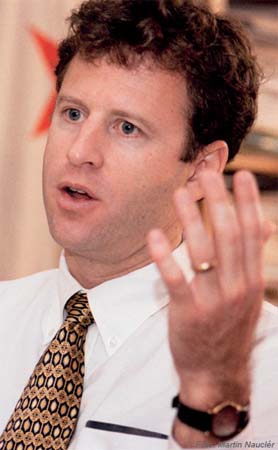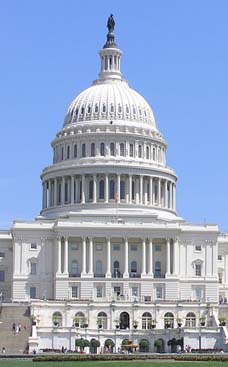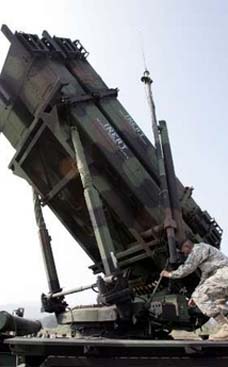2006.12.04: December 4, 2006: Headlines: COS - Congo Kinshasa: Foreign Policy: Brookings Institute: Iraq: he Daily Princetonian: RPCV Michael O'Hanlon writes: Iraq is one of the top five deadliest places on earth
Peace Corps Online:
Directory:
Congo - Kinshasa (Zaire):
Special Report: National Security Expert and Congo Kinshasa RPCV Michael O'Hanlon:
2006.12.04: December 4, 2006: Headlines: COS - Congo Kinshasa: Foreign Policy: Brookings Institute: Iraq: he Daily Princetonian: RPCV Michael O'Hanlon writes: Iraq is one of the top five deadliest places on earth
RPCV Michael O'Hanlon writes: Iraq is one of the top five deadliest places on earth

"The simplest conclusion to reach is that Iraq, now one of the two or three most violent places on Earth, is in civil war but not yet all-out absolute civil war. Does it matter? Politically, here at home, I believe Americans care less about semantics and more about whether they sense we have a credible strategy for victory — or at least for achieving some measure of stability in Iraq.(Research from various scholars, including Duke University professor Peter Feaver who now works for President Bush, backs up this generalization about what most determines American public support for the nation's wars.) I think the answer is that clearly Americans do not believe we are winning. They do not believe we presently have a strategy that will change the trajectory in Iraq. In other words, we already knew we were losing, whether one called this a civil war or not. The important question is can we turn things around, not whether we can find some way to spin events in Iraq into a more positive picture than the facts warrant. But let's call a spade a spade: Right now we are part of a losing operation, and Iraq is in a civil war. What is more, American voters know it — meaning that 2007 will probably be make or break time for this country's willingness to continue the war effort." Michael O'Hanlon, a Senior Fellow at the Brookings Institute and a Visiting Lecturer at Princeton University, served as a Peace Corps Volunteer in Congo Kinshasa.
RPCV Michael O'Hanlon writes: Iraq is one of the top five deadliest places on earth
One of the top five deadliest places on earth
By Michael O'Hanlon
Guest Columnist
Is Iraq in civil war, and does it matter whether we define the conflict that way or not? I believe the answer to the first question is clearly yes. The answer to the second is that it matters some (but perhaps not a lot).
The critical question is whether we and our Iraqi partners have a plausible strategy for victory — or at least a strategy for averting outright defeat, chaos in Iraq, the possibility of broader regional instability and the likelihood of an Iraqi government eventually emerging that is not at all to our liking. I am increasingly worried that the answer to this central question is no. But let's return for now to the questions of the day about civil war.
There are several possible definitions of civil war. The first is a broad term used to describe any society experiencing significant and at least semi-organized armed violence. By this criterion, Iraq is unambiguously in civil war. In fact, it has been since 2003. Often, research groups such as the Stockholm International Peace Research Institute call any conflict with more than 1,000 documented violent fatalities a year a civil war. Since Iraq is experiencing 3,000 such deaths a month, it exceeds this threshold by a factor of more than 30.
A second, and somewhat more specific and restrictive, definition of civil war is any conflict in which armed partisans fight in an organized way to pursue political aims in favor of their respective group at the expense of others. By this measure, Iraq has probably been in civil war since the Feb. 22, 2006 bombing of a holy Shia mosque in Samarra. (For a largely concurring view, see Lt. Gen. David Petraeus GS '87's remarks at Brookings this past September; I had the honor of attending grad school at Woody Woo with Petraeus, though he was in and out with his Ph.D. in about two or two-and-a-half years and it took me six). Since that date, according to the Pentagon's own data, there have been 10 to 15 violent incidents between different ethnic groups per day, in contrast to zero or one prior to that point. Increasingly since February, the militias committing such acts have been affiliated with, and often egged on by, political leaders such as Moqtada al-Sadr. I think this is the most accurate possible definition of civil war, hence I conclude that Iraq has been in such a state for about nine to 10 months now.
There is only one plausible definition of civil war that Iraq does not currently qualify for: all-out conflict in which central government dissolves and all major political figures take sides in a struggle that becomes primarily a battlefield test of power. (The American civil war was such a struggle, as were the Rwandan and Bosnian civil wars of the 1990s.) Thankfully, Iraq is not in such a state, which is another way of saying that things could still get much worse.
The simplest conclusion to reach is that Iraq, now one of the two or three most violent places on Earth, is in civil war but not yet all-out absolute civil war.
Does it matter? Politically, here at home, I believe Americans care less about semantics and more about whether they sense we have a credible strategy for victory — or at least for achieving some measure of stability in Iraq.(Research from various scholars, including Duke University professor Peter Feaver who now works for President Bush, backs up this generalization about what most determines American public support for the nation's wars.) I think the answer is that clearly Americans do not believe we are winning. They do not believe we presently have a strategy that will change the trajectory in Iraq. In other words, we already knew we were losing, whether one called this a civil war or not. The important question is can we turn things around, not whether we can find some way to spin events in Iraq into a more positive picture than the facts warrant.
For the second straight semester at Princeton, I now have the honor of working with some very fine students to try to figure out ways to change the dynamic within Iraq. There is in my view still hope of doing so.
But let's call a spade a spade: Right now we are part of a losing operation, and Iraq is in a civil war. What is more, American voters know it — meaning that 2007 will probably be make or break time for this country's willingness to continue the war effort.
Michael O'Hanlon '82 GS '91 is a visiting lecturer at the Wilson School and Senior Fellow of Foreign Policy Studies the Sydney Stein, Jr. Chair at the Brookings Institution. He is coauthor of "Hard Power: The New Politics of National Security" and may be reached at mohanlon@brookings.edu.
Links to Related Topics (Tags):
Headlines: December, 2006; RPCV Michael O'Hanlon (Congo Kinshasa); Peace Corps Congo Kinshasa; Directory of Congo Kinshasa RPCVs; Messages and Announcements for Congo Kinshasa RPCVs; Iraq
When this story was posted in December 2006, this was on the front page of PCOL:





Peace Corps Online The Independent News Forum serving Returned Peace Corps Volunteers
 | Ron Tschetter in Morocco and Jordan
On his first official trip since being confirmed as Peace Corps Director, Ron Tschetter (shown at left with PCV Tia Tucker) is on a ten day trip to Morocco and Jordan. Traveling with his wife (Both are RPCVs.), Tschetter met with volunteers in Morocco working in environment, youth development, health, and small business development. He began his trip to Jordan by meeting with His Majesty King Abdullah II and Her Majesty Queen Rania Al Abdullah and discussed expanding the program there in the near future. |
 | Chris Dodd's Vision for the Peace Corps
Senator Chris Dodd (RPCV Dominican Republic) spoke at the ceremony for this year's Shriver Award and elaborated on issues he raised at Ron Tschetter's hearings. Dodd plans to introduce legislation that may include: setting aside a portion of Peace Corps' budget as seed money for demonstration projects and third goal activities (after adjusting the annual budget upward to accommodate the added expense), more volunteer input into Peace Corps operations, removing medical, healthcare and tax impediments that discourage older volunteers, providing more transparency in the medical screening and appeals process, a more comprehensive health safety net for recently-returned volunteers, and authorizing volunteers to accept, under certain circumstances, private donations to support their development projects. He plans to circulate draft legislation for review to members of the Peace Corps community and welcomes RPCV comments. |
 | He served with honor
One year ago, Staff Sgt. Robert J. Paul (RPCV Kenya) carried on an ongoing dialog on this website on the military and the peace corps and his role as a member of a Civil Affairs Team in Iraq and Afghanistan. We have just received a report that Sargeant Paul has been killed by a car bomb in Kabul. Words cannot express our feeling of loss for this tremendous injury to the entire RPCV community. Most of us didn't know him personally but we knew him from his words. Our thoughts go out to his family and friends. He was one of ours and he served with honor. |
 | Peace Corps' Screening and Medical Clearance
The purpose of Peace Corps' screening and medical clearance process is to ensure safe accommodation for applicants and minimize undue risk exposure for volunteers to allow PCVS to complete their service without compromising their entry health status. To further these goals, PCOL has obtained a copy of the Peace Corps Screening Guidelines Manual through the Freedom of Information Act (FOIA) and has posted it in the "Peace Corps Library." Applicants and Medical Professionals (especially those who have already served as volunteers) are urged to review the guidelines and leave their comments and suggestions. Then read the story of one RPCV's journey through medical screening and his suggestions for changes to the process. |
 | The Peace Corps is "fashionable" again
The LA Times says that "the Peace Corps is booming again and "It's hard to know exactly what's behind the resurgence." PCOL Comment: Since the founding of the Peace Corps 45 years ago, Americans have answered Kennedy's call: "Ask not what your country can do for you--ask what you can do for your country. My fellow citizens of the world: ask not what America will do for you, but what together we can do for the freedom of man." Over 182,000 have served. Another 200,000 have applied and been unable to serve because of lack of Congressional funding. The Peace Corps has never gone out of fashion. It's Congress that hasn't been keeping pace. |
 | PCOL readership increases 100%
Monthly readership on "Peace Corps Online" has increased in the past twelve months to 350,000 visitors - over eleven thousand every day - a 100% increase since this time last year. Thanks again, RPCVs and Friends of the Peace Corps, for making PCOL your source of information for the Peace Corps community. And thanks for supporting the Peace Corps Library and History of the Peace Corps. Stay tuned, the best is yet to come. |
 | History of the Peace Corps
PCOL is proud to announce that Phase One of the "History of the Peace Corps" is now available online. This installment includes over 5,000 pages of primary source documents from the archives of the Peace Corps including every issue of "Peace Corps News," "Peace Corps Times," "Peace Corps Volunteer," "Action Update," and every annual report of the Peace Corps to Congress since 1961. "Ask Not" is an ongoing project. Read how you can help. |
Read the stories and leave your comments.

Some postings on Peace Corps Online are provided to the individual members of this group without permission of the copyright owner for the non-profit purposes of criticism, comment, education, scholarship, and research under the "Fair Use" provisions of U.S. Government copyright laws and they may not be distributed further without permission of the copyright owner. Peace Corps Online does not vouch for the accuracy of the content of the postings, which is the sole responsibility of the copyright holder.
Story Source: he Daily Princetonian
This story has been posted in the following forums: : Headlines; COS - Congo Kinshasa; Foreign Policy; Brookings Institute; Iraq
PCOL35385
27


















